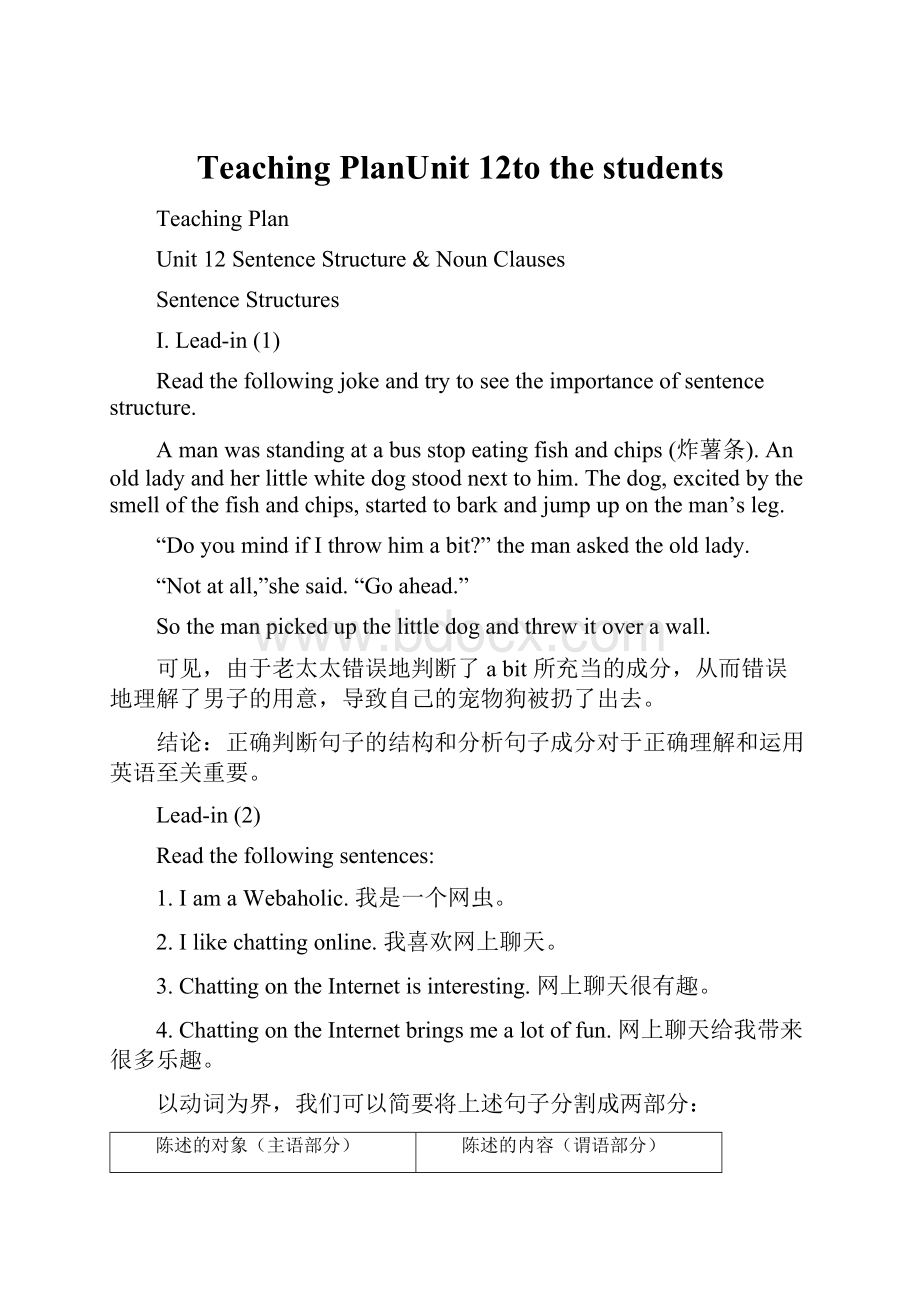 Teaching PlanUnit 12to the students.docx
Teaching PlanUnit 12to the students.docx
- 文档编号:23378156
- 上传时间:2023-05-16
- 格式:DOCX
- 页数:16
- 大小:24.86KB
Teaching PlanUnit 12to the students.docx
《Teaching PlanUnit 12to the students.docx》由会员分享,可在线阅读,更多相关《Teaching PlanUnit 12to the students.docx(16页珍藏版)》请在冰豆网上搜索。

TeachingPlanUnit12tothestudents
TeachingPlan
Unit12SentenceStructure&NounClauses
SentenceStructures
I.Lead-in
(1)
Readthefollowingjokeandtrytoseetheimportanceofsentencestructure.
Amanwasstandingatabusstopeatingfishandchips(炸薯条).Anoldladyandherlittlewhitedogstoodnexttohim.Thedog,excitedbythesmellofthefishandchips,startedtobarkandjumpupontheman’sleg.
“DoyoumindifIthrowhimabit?
”themanaskedtheoldlady.
“Notatall,”shesaid.“Goahead.”
Sothemanpickedupthelittledogandthrewitoverawall.
可见,由于老太太错误地判断了abit所充当的成分,从而错误地理解了男子的用意,导致自己的宠物狗被扔了出去。
结论:
正确判断句子的结构和分析句子成分对于正确理解和运用英语至关重要。
Lead-in
(2)
Readthefollowingsentences:
1.IamaWebaholic.我是一个网虫。
2.Ilikechattingonline.我喜欢网上聊天。
3.ChattingontheInternetisinteresting.网上聊天很有趣。
4.ChattingontheInternetbringsmealotoffun.网上聊天给我带来很多乐趣。
以动词为界,我们可以简要将上述句子分割成两部分:
陈述的对象(主语部分)
陈述的内容(谓语部分)
I
amaWebaholic.
I
likechattingonline.
ChattingontheInternet
isinteresting.
ChattingontheInternet
bringsmealotoffun.
结论:
一个完整的英文句子由两部分组成:
“陈述对象+陈述内容”,即“主语+谓语”,或者“名词+动词”。
In-ClassEx.1
I.找出下列句子的主语部分和谓语部分
1.StudyingEnglishtakestime.
2.Thefirststepisalwaysthehardest.
3.Afriendinneedisafriendindeed.
4.Apoormanisnotnecessarilyunhappy.
5.Livingwithoutanaimislikesailingwithoutacompass.
6.Confidenceinyourselfisthefirststepontheroadtosuccess.
II.把下列词语排列成正确的英语句子(有的不止一种排列顺序)
1.afish,we,ate
2.gave,thebook,Mary,toherfather
3.forthemoney,Simon,newspapers,sells
4.found,the,they,boy,dead
5.the,the,boy,dog,loves,black
II.Lecture
根据动词的后面是否有宾语和补语,可以把句子分成五种,即构成英语简单句的五种基本句型。
句型一:
主语+系动词+表语
句型二:
主语+谓语
句型三:
主语+谓语+宾语
句型四:
主语+谓语+间接宾语+直接宾语
句型五:
主语+谓语+宾语+宾语补足语
Structure1:
S+V+C(subject+linkingVerb+complement)
该句型的谓语动词是系动词。
1.Beautyisintheeyeofthebeholder.
2.Lifeisbeautiful.
3.Thismatterrestsamystery.
4.Helookstired.
英语中的系动词有五大类:
1.系动词be(is,am,are,was,were)
*LearningEnglishisimportant.
*IamaWebaholic.
2.单纯表示主语的特征、状态的:
feel,look,sound,taste,smell,seem,appear
*Theironfeelshot.
*Therosedoesn’tsmellmuch.
3.表示主语由一种状态转变为另外一种状态:
become,grow,get,turn,fall,go,come
*Theleafwillturnyellowinautumn.
*Thedreamhascometrue.
4.表示主语保持某种状态的:
continue,remain,stay,keep,hold,rest,prove
*Ifyoudon’tstaybusy,youdie.
*Heheldsilentforthewholeday.
5.近似于不及物动词的系动词:
sit,act,arrive,blush,marry,die,beborn
*JaneAustendiedaspinster.
*LeiFengdiedyoung.
*Alltheaudiencesatsilent.
Structure2:
S+V(subject+IntransitiveVerb)
S+V+A(subject+Intransitiveverb+adverbial)
该句型的谓语动词是不及物动词。
1.Ironrusts.
2.Manproposes;Goddisposes.
3.Heworkshard.
4.Greatmindsthinkalike.
Structure3:
S+V+O(subject+transitiveverb+object)
S+V+O+A(subject+transitiveverb+object+adverbial)
该句型的谓语动词是及物动词。
1.Beautywillbuynobeef.
2.Iwanttogohomenow.
3.I’vefinishedreadingthebook.
4.I’llpickyouupthisevening.
Structure4:
S+V+O+O
(subject+dativeverb+indirectobject+directobject)
该句型的谓语动词是双宾动词。
1.Chattingonlinewillbringyoualotoffun.
2.Helentmetenyuan.
3.Iwillbuyyouameal.
4.Igavehimmybook.
双宾动词分为以下几种类型:
1.“give”group:
1)give+indirectobject+directobject(givesb.Sth.)
2)give+directobject+to+indirectobject(givesth.tosb.)
这类动词包括:
assign,award,bring,deliver,deny,feed,grant,hand,lend,offer,owe,pass,pay,promise,post,read,recommend,sell,send,show,take,write等。
e.g.Iwillbringyouthebook.
Iwillbringthebooktoyou.
2.“buy”group:
1)buy+indirectobject+directobject
2)buy+directobject+for+indirectobject
这类动词包括:
book,buy,build,change,choose,cook,fetch,find,get,keep,make,order,prepare,sing等。
e.g.Iwillbuyyouagift.
Iwillbuyagiftforyou.
3.Group3:
alwaysS+V+IO+DO
这类动词包括:
charge,cost,bet等。
e.g.Therestaurantchargedus£40forthewine.
Afullday'sactivitieswillcostyou£45.
Hebetme£10thatIwouldn'tdoit.
4.ask----“of”
e.g.
CanIaskyouaquestion?
CanIaskaquestionofyou?
Structure5:
S+V+O+OC
(subject+factitiveverb+object+objectcomplement)
该句型中的谓语动词是宾补动词。
常见的宾补动词有:
appoint,believe,call,choose,consider,declare,elect,feel,find,imagine,keep,leave,let,make,name,nominate,prove,see,suppose,vote等等。
e.g.TheyelectedJohnchairman.
Youcanleavethedooropen.
Thedirectorsappointedhimsalesmanager.
NounClauses
Lead-inquestions:
1.什么是名词:
表示人或事物的名称的词叫名词。
2.名词在句子当中一般可以作什么成分?
e.g.TheboyisliMing.
主语表语
Mr.Liang,a24-year-oldboy,teachesusEnglish.
主语同位语宾语
结论:
名词在句中主要作主语、宾语、表语和同位语。
3.什么是名词性从句?
在英语的句子结构中,本来该由名词充当的主语、宾语、表语和同位语,由一个句子来充当,这个句子就叫名词性从句。
主语从句(TheSubjectClause)
宾语从句(TheObjectClause)
名词性从句
表语从句(ThePredicativeClause)
同位语从句(TheAppositiveClause)
In-classEx.2:
请判断出下列的句子哪部分是从句,并判断属于哪种从句:
1.WhatIwanttodoistakingabath.(主从)
2.Thenewsthattheywonthegamespreadthewholeschool.(同位语从句)
3.Idon’tthink(that)heisanhonestboy.(宾从)
4.Thefactisthathestolethecar.(表从)
5.Doyouknowthefactthathestolethecar?
(同位语从句)
6.Itissaidthattheywonthegame(主从)
4.阅读下列句子,总结出能够引导名词性从句的连词有哪些?
1.Ireallyfeelthatheneedsmoreexperience.
2.Iwanttoknowwhether/ifshestillliveshere.
3.Whatshesaidisnottrue.
4.Whobrokethewindowhasnotbeenfoundout.
5.Heaskedwhosehandwritingisthebestinourclass.
6.Thatiswhyshelefthomeyesterday.
7.HaveyouheardthenewsthatMarywillbebacksoon?
8.Iwillgiveittowhoeverneedsit.
9.Itisunwisetogiveyourchildwhateverhewants.
10.I’vejustboughtfivenewbooks;youcantakewhicheverbookyoulike.
结论:
that;whether(…ornot/主语,表语,同位语)/if
who;whom;whose
what;which
when;where;why;how
whatever;whichever;whoever
一、主语从句:
在句中充当主语的从句叫做主语从句。
Examples:
•Thattheyarestillaliveisaconsolation.
•Thathehasbeenlateforworkoverandoveragainisaseriousmatter.
•Whetherweshallhavethematchremainsuncertain.
连接词:
what,who,whom,whose,which,whatever,whoever,whomever,whichever,whosever,when,where,why,how,whenever,wherever,however,whether
In-classEx.3选择适当的连接词填空
1._______shesaidpuzzledhim.
2._______shesaidsuchathingpuzzledhim.
3._____________weshouldsendtotakepartinthepartyistobediscussed.
4._______theydon’twanttodroptheplanisclear.
5._______hefinishedtheworkinsoshorttimeremainsaquestion.
6.________itisgoingtosnowthiseveningisnotcertain.
Keys:
1.what2.why3.who/whom4.that5.how6.whether
用it引导形式主语的句子:
Itis…that…
Itseems(appears,turnsout,comesabout…)that…
•Thathecan’tattendthepartyisapity.
Itisapitythathecan’tattendtheparty.
•Howmuchmoneyisneededishardtosay.
Itishardtosayhowmuchmoneyisneeded.
•Thatthemoonmovesaroundtheearthisknowntoall.
Itisknowntoallthatthemoonmovesaroundtheearth.
In-classEx.4:
选择适当的连接词填空
1.Itisawonder_____youweren'tinjured.
2.Itisstillunknown______and______thistookplace.
3.Itmakesnodifferencetome_________heisrichorpoor.
4.Itisnotyetdecided_______istotakeherplaceassecretary.
5.Itissaid______thisplazahas15cinemas.
6.Itdoesn'tmatter_______youaregoingtodoit.
Keys:
1.that2.whenandwhere3.whether4.who5.that6.whether
二、宾语从句:
在句中充当及物动词,介词宾语的句子叫做宾语从句。
•Shesaid(that)sheisgoingtolearnEnglish.
•Iwanttoknowwhether/ifshestilllivesthere.
•Idon’tknowwhoallthesepeopleare.
•ShewantstoknowwhichfilmIlikebest.
•
注意1:
that在从句中不充当任何成分,在口语或非正式的文体中常常被省去。
但如果从句是并列句时,第二个及以后的分句前that不可省.
•Idon’tknow(that)youwillcomehere.
•Weallagreed(that)itwouldbeamistakenottotakehisadvise.
•Weallthink(that)sheisworkinghardandthatshewillsurelygotoagoodcollege.
注意2:
在宾语从句中,表示“是否”既可以用whether,也可以用if.但是,whether常与ornot连用;作介词宾语只用whether;从句是否定句时一般用if。
●Idon’tknowwhether/ifhewillcome.
●Iwanttoknowwhetherhewillcomeornot.
●Areyoutalkingaboutwhetherhewillcome?
●Hedoesn’tcareifitisn’tafineday.
In-classEx.5用适当的连接词完成句子
1.WangHaitoldme_____hedidn'tgocyclingyesterdayafternoon.(how,why)
2.Canyoutellme______elseisgoingtobeondutytoday?
(who,whom)
3.Shesaid_____itwouldn'tmattermuch.(that,if)
4.Healwaysthinks______hecandobetter.(how,who)
5.Ireallydon'tknow________thebridgewillbefinished.(howlong,howsoon)
6.Theydon'tknow__________wearegoinghiking.
7.Shewantedtoknow___________hercoatwouldbereadythenextday.
8.Iwasreallysurprisedat______Isaw.
9.Idon'tknow______somanypeoplecrowdingroundhim
10.Doyouknow_________shirtitis?
Keys:
1.why2.who3.that4.how5.howsoon
6.if/whether7.if/whether8.what9.why10.whose
注意3:
宾语从句中的否定转移--如果宾语从句是由think,believe,imagine,suppose等词引导的时候,要将从句中的否定形式转移到主句中去。
Forexample:
translatethesentenceintoEnglish
我认为他不会来这里.
Ithinkhewon’tcomehere.()
Idon’tthinkhewillcomehere.(√)
Moreexamples:
Idon’tthinkhewilllietome.我认为他不会对我撒谎的.
Idon’tthinkweshouldlendhimmoney.我认为我们不应该借钱给他.
注意4:
如果主句中有形容词或名词作宾语补足语时,一般用it来作形式宾语,把从句放在宾补后面。
that不能省。
常用的动词有believe,consider,feel,find,make,think
e.g.
•Wethinkitourdutythatweshouldhelpothers.
•Ifinditimpossiblethatheshouldfinishtheworkintwodays.
In-classEx.6:
句型转换
1.Whendoesthetrainarrive?
Pleasetellme.(改为宾语从句)→
Pleasetellme__________________________________.
2.
- 配套讲稿:
如PPT文件的首页显示word图标,表示该PPT已包含配套word讲稿。双击word图标可打开word文档。
- 特殊限制:
部分文档作品中含有的国旗、国徽等图片,仅作为作品整体效果示例展示,禁止商用。设计者仅对作品中独创性部分享有著作权。
- 关 键 词:
- Teaching PlanUnit 12to the students 12 to
 冰豆网所有资源均是用户自行上传分享,仅供网友学习交流,未经上传用户书面授权,请勿作他用。
冰豆网所有资源均是用户自行上传分享,仅供网友学习交流,未经上传用户书面授权,请勿作他用。


 《公务员财产申报制度》.docx
《公务员财产申报制度》.docx
 校园艺术节活动之数学竞赛PPT课件下载推荐.ppt
校园艺术节活动之数学竞赛PPT课件下载推荐.ppt
